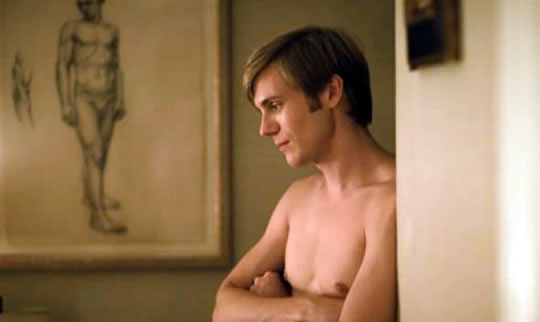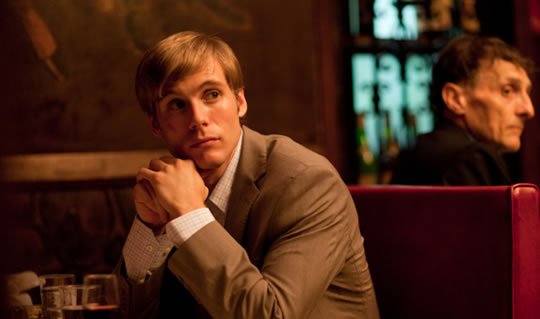 Recipient of the esteemed Teddy Award at this year’s Berlin International Film Festival, Keep the Lights On, directed by Ira Sachs, chronicles an emotionally and sexually charged journey of two men in New York City through love, friendship, and addiction. Documentary filmmaker Erik (acclaimed Danish actor Thure Lindhardt in his first leading role in a U.S. film) and closeted lawyer Paul (Zachary Booth, Damages) meet through a casual encounter, but soon find a deeper connection and become a couple. Individually and together, they are risk takers—compulsive, and fueled by drugs and sex. In an almost decade-long relationship defined by highs, lows, and dysfunctional patterns, Erik struggles to negotiate his own boundaries and dignity while being true to himself.
Recipient of the esteemed Teddy Award at this year’s Berlin International Film Festival, Keep the Lights On, directed by Ira Sachs, chronicles an emotionally and sexually charged journey of two men in New York City through love, friendship, and addiction. Documentary filmmaker Erik (acclaimed Danish actor Thure Lindhardt in his first leading role in a U.S. film) and closeted lawyer Paul (Zachary Booth, Damages) meet through a casual encounter, but soon find a deeper connection and become a couple. Individually and together, they are risk takers—compulsive, and fueled by drugs and sex. In an almost decade-long relationship defined by highs, lows, and dysfunctional patterns, Erik struggles to negotiate his own boundaries and dignity while being true to himself.
Bijan Tehrani: What was the motivation for making Keep the Lights On? Is it based on your personal experience and for that reason was it difficult to make?
Ira Sachs: It’s actually easier to make a film that has a lot going on emotionally because you know there is a good story and you know that there are access points for the audience emotionally. I am a kind of realist filmmaker and I am interested in a certain kind of observational cinema so in a way when there is something as dramatic as this story, it works because it creates an emotional accessibility to the audience. Keep the Lights On it is a very personal film I wrote it a few years after having finished a relationship and when the relationship was over I had a sense that there was a good story in the course of that relationship. So for me, in every film, you can approach the story almost like an anthropologist or a sociologist as long as the story line itself has power.
BT: When a story comes from the director’s life it is hard to be fair and realistic.
IS: This is my 4th feature and all my films are based on very personal stories, so I would not start a film until I believed that I have the most intimate access with the details of the story I want to tell but also a certain kind of distance which makes it possible for me to be the story teller. Therefore I think if I had another job other than film directing I would have been drawn to being a psychoanalyst a very similar position and I think to be a good therapist you need to have both intimacy and analytic distance and the same is true for a filmmaker and each is as important as the other.
BT: It is interesting how you were able to relate your emotions to the actors especially the character of Eric. How id you go about casting the film and how did you communicate the characters to your actors?
IS: Casting is always a very associative process where you try instinctually considering the actor inside your story and you have to assume that they will never learn anything but what they present in the first moment. Therefore I really cast people more than actors in a lot of ways. When I finished the script of Keep the Lights On, I had a sense that it might need to be cast in a different kind of way then conventionally. I sent the script to an agent in Hollywood and his response was that no one in his agency would be available to play Eric’s part. That was a sort of sign that I would have to look outside of America to find the right actor. For this sort of film I have always been draw to European actors and to non-American actors. I have worked with non American actors in Forty Shades of Blue. I think European actors are drawn to realism; it’s interesting that I am interviewed here by Cinema Without Borders, because I think Keep the Lights On will has many non-Americans worked on it. We have Greeks, Brazilians, Romanians, etc. and I think that this was necessary to create a film whose imagery is not typically American, I think that there is a very Prudish relationship to the body and sexuality in American cinema and I was trying to make a film that was opposite of that and one of the ways I did that was surrounding myself with people who have a different way of looking at things. I think specifically if you look at the cinematographer who is Greek and his body of work includes films like Dogtooth, you see his relationship to sex is almost anti-American in a certain way because his world is extremely open to sexuality and there, body is not something to be frightened of.
 BT: How did you come up with the visual style of Keep the Lights On?
BT: How did you come up with the visual style of Keep the Lights On?
IS: With my cinematographer, we both worked on instincts. I have been in New York for twenty-five years and therefore I have a certain intimacy with the city and how it feels to me as an artist and what I have to convey through the film. I had the opportunity to shoot on film and I used super 16, some people have commented that it gives the film a nostalgic tone, but to me that is just how I view film. I am not going backwards, I just find that the accidents that happen through the use of film are still a texture that I am very interested in. The cinematographer had never been to New York before; it was like New York seen through the eye of an outsider, and myself, an insider, so that added to the quality of the image.
BT: I think looking at your work reminds me of Polanski and I how he deals with human issues in very open way, a very European approach that is not afraid of dealing the with human body and issues that we deal with every day.
IS: Thank you, I think my sensibility is European American, I think when I was young I was very enamored by Austrian and German cinema and my first film, The Delta, was almost a fantasy of how a German film would be made if it was made in Memphis TN, it is heavy in a certain way and I hope that I made it authentic to me, but certainly influenced by German filmmaking history. We were watching Maurice Della, who I think is the godfather of contemporary French cinema and he was always concerned with capturing life on the screen and how the camera can do that but still maintain a visual beauty which makes it different that life and I think that is one of the things we set out to do.
BT: What is the next project you are working on?
IS: I am working on a love story, I think it is the first film that I have made about the possibility of love blossoming instead of destroying, I think I am able to make this film because of Keep the Lights On, that is a story about secrets , shame and a relationship that is completely obsessive and enclosed. But my next film is the total opposite of that; the film is open and the lights are on and it is told shamelessly. It is about two men that have been together for 38 years and are about to get married but one is fired from his job as a director at an all boys catholic private school. The film is about the challenge they face because they lose their house and their home together and they try to stay together and hold on to what they have and what they have built for 40 years.

